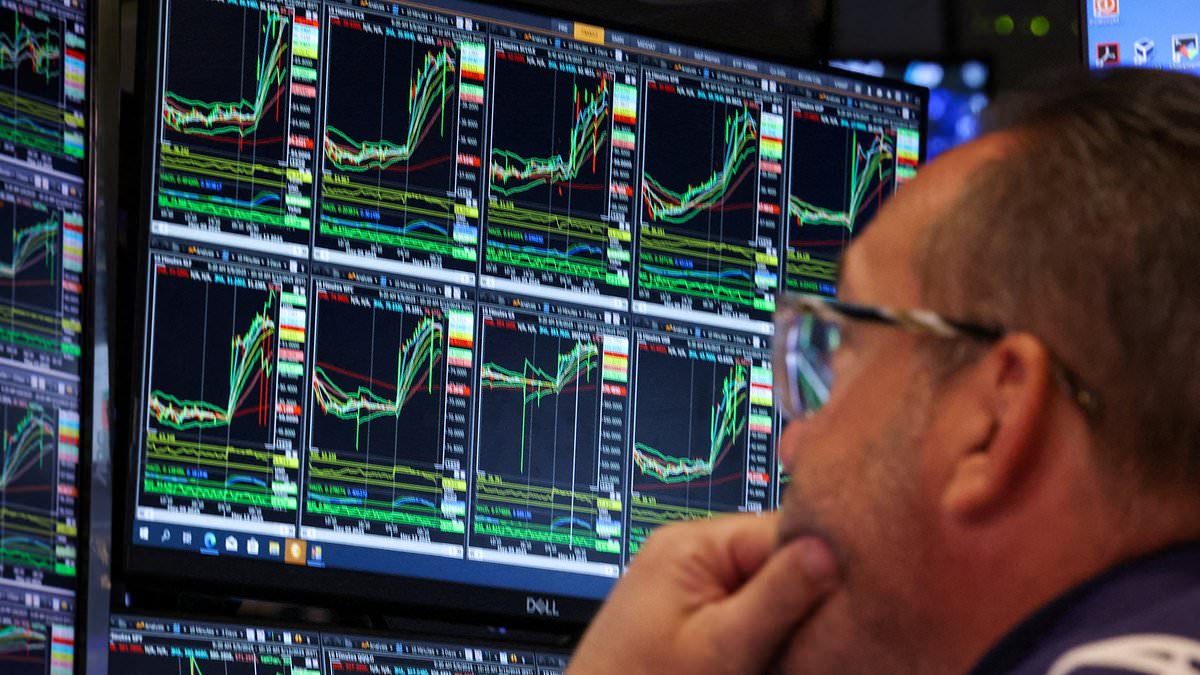A world-renowned economist has changed his tune on President Donald Trump’s tariffs.
Torsten Sløk, a chief economist at Apollo Global Management, posted a new note admitting that his initial reaction to the policy may have been wrong.
‘Maybe the administration has outsmarted all of us,’ he wrote.
The admission comes just months after Sløk warned the tariffs would be ‘painful’ and economically destabilizing.
Experts speaking to DailyMail.com warned that Americans should take his note with a grain of salt.
But now, he’s framing the President’s policy as a clever long-game — one that invites global negotiation while increasing federal revenue.
In the note, Sløk outlined a potential scenario: the White House could maintain its current tariff rates — 10 percent on most imports, 30 percent on Chinese goods — and give trade partners a year to negotiate with the White House.
Extending the current 90-day pause on new tariffs, he argued, would give American companies time to plan ahead and could help stabilize markets.

Wall Street has seen a resurgence since President Trump pared back his initial tariff stance
‘This would seem like a victory for the world and yet would produce $400 billion of annual revenue for US taxpayers,’ he added.
The timing is key. Trump’s 90-day pause on new tariffs, announced in April, is set to expire on July 9.
Without an extension, the tariffs would immediately increase, with billions of dollars worth of products suddenly incurring more taxes.
But if the President extends the pause but keeps tariffs where they are, Sløk says the policy could offer clarity for companies and leverage in negotiations.
Sløk’s sudden, tepid support for the tariffs is an about-face. He initially criticized the import taxes, saying they threatened business stability, Wall Street’s record highs, and the stability of US treasury bonds.
‘The short-run effects of a trade war [are] certainly painful,’ the economist told Yahoo Finance in February.
And not everyone is convinced. Neil Saunders, a retail expert at GlobalData, warned that they will mostly impact American consumers.
‘Tariffs, at any level, increase the cost of doing business,’ he told DailyMail.com. ‘If tariff rates remain at current levels, prices should only increase modestly – although these hikes will come off the back of years of pretty hefty inflation.’

President Trump initially slapped tariffs on all imported goods from other countries

Retail experts remain skeptical about Trump’s direction with tariff policies

Independent analysts told DailyMail.com that tariffs will likely raise prices on American families, including common consumer goods like groceries

Torsten Sløk, initially a skeptic of Trump’s tariff policies, has become more optimistic about America’s financial future
Read More
EXCLUSIVE
Target's own staff blow whistle on HUGE price hikes across the store: 'Everything's going up'

He added: ‘The problem is, no one knows what will happen to tariffs. The policy has been erratic and remains uncertain.’
Trump has also been ramping up pressure on both domestic and global fronts while trying to start negotiations with nearly every country around the world.
At home, he’s pushing Republicans to pass the sweeping ‘Big Beautiful Bill’ by July 4 — a legislative package that could outline his domestic agenda, but has drawn criticism from some of his most prominent allies.
Elon Musk, the biggest donor in the 2024 Presidential election, called it a ‘disgusting abomination.’
At the same time, the President has escalated his rhetoric on Iran since America bombed the country’s nuclear facilities.
In a Sunday night post on Truth Social, he wrote: ‘It’s not politically correct to use the term, “Regime Change,” but if the current Iranian Regime is unable to MAKE IRAN GREAT AGAIN, why wouldn’t there be a Regime change??? MIGA!!!’
As the tariff deadline approaches, the biggest unknown remains whether Trump is bluffing on country-by-country negotiations — or if the higher import taxes are here to stay.
‘Unless their name is President Donald Trump,’ Saunders said, ‘anyone saying they know what will happen to tariffs is not being completely honest.’
